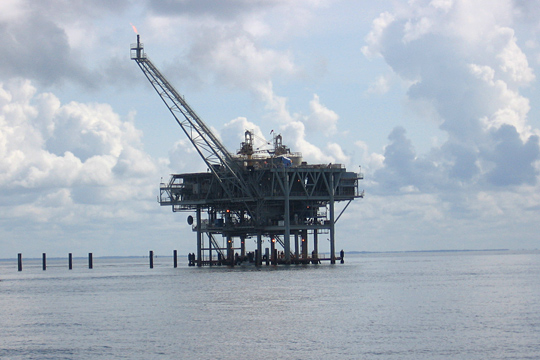I recently listened to a program discussing the Offshore Drilling proposal being debated in the US at present ("A Closer Look at Offshore Drilling" TotN 8/11). After hearing both sides of the debate and trying to stay open to the arguments, the supposed benefits just don't seem to add up.
To think this would lower the price consumers pay for energy, especially at the pump, is lofty at best. Any oil would not affect oil prices for the next 30 years according to the Department of Energy (as quoted in the program), and even then would be a pebble in the ocean.
Those supporting the option then turn to the argument that these platforms are much safer than they were 30 or 40 years ago and we should ignore the oil slicks or accept that they are just natural occurrences. A further extension of this argument says that oil barge accidents result in more oil being dumped in the ocean in a single case than over an entire year for these offshore platforms. Still another argument says that windmills kill birds too so might as well just stick with what we know. This "lesser of two evils" argument seems childishly stubborn and there are too many tar covered beaches to be duped into believing it.
On the other hand, to keep the moratorium in place and avoid having States compete over who will buy their shorelines would force us to look towards other forms of energy--for which there are many. I believe the argument comes down to "renewable" versus "non-renewable". That's been at the crux of the problem for a long time, and we've been faced with this since the 70's at the latest. So the benefit of exploiting oil resources offshore is not only at the expense of desecrating the environment, but also at the risk of putting off development of renewable energy sources even longer. At some point we have to accept that we need to move in a different direction and that it is better done now than later (see the Stern Review for more on that).
After the housing bubble, I hope people realize that they need to do something to prevent firms from feeding off what is common property (i.e. "tragedy of the commons") and exploiting what they call "externalities" (which really means taking what is not theirs), and giving very little in return or assuming they can lean on the public who will always sacrifice for the greater economic good.
Actually, the problem is not exploiting natural resources. The problem is when those resources are finite/non-renewable, dirty, and come at the expense of the public economy and general well-being. If something is renewable/sustainable, then there is a level at which we can exploit it at very near zero sacrifice. The Alaskan pipeline didn't free us from the corner we've painted ourselves in, and offshore drilling won't either. This is just new wallpaper on an old problem when, in fact, it's time to start thinking outside the box and breaking down some walls in order to construct new ones.
skip to main |
skip to sidebar
Idiom:
to cross or pass the Rubicon, to take a decisive, irrevocable step.
Say the Eco Pledge of Allegiance to the 3Rs!!
"One EcoGeekdom, under Mother Nature, with liberty and recycled materials for all."
Blog Archive
- March (1)
- February (37)
- January (3)
- June (1)
- May (1)
- August (1)
- June (1)
- April (1)
- February (1)
- October (1)
- August (7)
- July (3)
- June (3)
- May (3)
- April (2)
- March (5)
- February (2)
- January (4)
- December (7)
- November (11)
- October (8)
- September (10)
- July (6)
- June (5)
- May (8)
- April (7)
- March (14)
- February (17)
Search
Rubicon by Topic
- book (1)
- Brazil (1)
- China (8)
- entertainment (3)
- environment (25)
- Ethiopia (1)
- Fiction (2)
- frugal (2)
- game (1)
- GIS (1)
- gym (1)
- history (2)
- India (2)
- Japan (8)
- language (1)
- leisure (8)
- news items (19)
- observations (21)
- radio (7)
- Toastmaster (8)
- train pass (5)
- travel (4)
- work (16)
Blogroll
- Al Gore's blog
- Cai Web blog (in Japanese)
- Cai's Linelife Site
- climate crisis
- David Suzuki
- Environmental Defense Fund
- Ervilha
- grist eco-blog
- how to talk to a climate skeptic
- Lester Brown @ Earth Policy Institute
- Letters from Olivia (in Japanese)
- Plenty Magazine
- real climate
- Utopiates
- Verdurous "greenie" blog
- We h e a r t Japan



